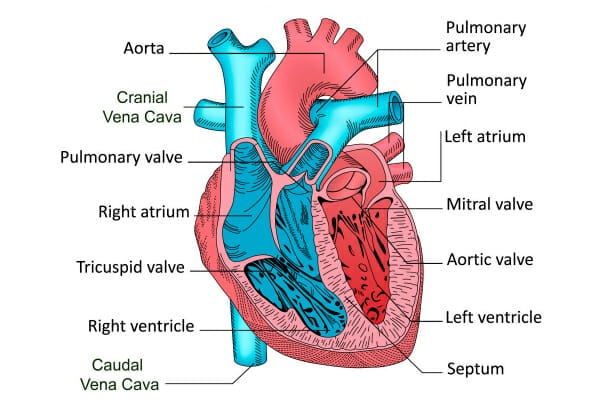A heart murmur in dogs can have different causes with varied outlooks. Some are harmless but others can be very serious. Integrative veterinarian, Dr. Julie Buzby, equips you with information about the causes, symptoms, diagnosis, and treatment for heart murmurs in dogs.

Every time I do a physical exam on one of my patients, I always listen carefully to his or her heart and lungs. It’s an important part of the physical exam, and one of the reasons I believe wellness exams are a critical part of protecting your dog’s health. I hope that when I am done listening, I can smile and say, “Everything sounds great!”
But I would also much rather find a heart murmur while your dog is still feeling and acting totally normal. This way we can take a proactive approach to finding the reason for the murmur and determining the best course of action. Without that wellness exam, a heart murmur could easily go undiagnosed until it starts causing some serious problems. By then, more damage is done and we are playing catch-up.
What is a heart murmur?
Normally, when listening to your dog’s heart with a stethoscope, your vet would hear a crisp “lub-dub” sound. However, sometimes he or she may hear a “whoosh” superimposed over the beat. This abnormal heart sound is called a murmur.
Heart anatomy
To understand heart murmurs, you need to know a bit about the structures in the heart. There are four chambers that make up the heart—the right atrium, the right ventricle, the left atrium, and the left ventricle. To keep the chambers separated, small heart valves open and close depending on if the chambers are pumping or filling with blood. Pressure gradients in the heart work with the valves to keep blood flowing in the correct direction.

Blood makes its way back to the heart after it has delivers its oxygen to the body. It enters the right atrium then goes through the tricuspid valve and into the right ventricle. Then the right ventricle pumps the blood through the pulmonic valve and into the main pulmonary artery, which leads to the lungs. As blood flows through the lungs, it picks up oxygen.
Next the blood flows from the pulmonary veins into the left atrium. Then it moves through the mitral valve and into the left ventricle. Finally, the left ventricle pumps the blood through the aortic valve and into the aorta. This large artery sends blood to the rest of the body.
What creates a heart murmur?
The sound of the murmur comes from turbulent blood flow in the heart. Blood may be flowing backwards through a leaky valve, being forced through a narrowed valve, or moving through an abnormal hole or vessel connection in the heart. Or sometimes the blood is thin and watery, which changes the flow dynamics.
How are heart murmurs classified?
One method of classification involves grading the intensity or loudness of the murmur on a scale from one to six:
- Grade I: Very faint and requires careful listening in a quiet room.
- Grade II: Soft but consistent.
- Grade III: Moderate in intensity and easy to hear.
- Grade IV: Loud but no palpable thrill (vibration of the chest wall made by turbulent blood flow).
- Grade V: Loud with palpable thrill.
- Grade VI: Loud enough to be heard with stethoscope off chest wall and has palpable thrill.

Your vet also will classify the murmur based on its location. For example, a dog might have a left-sided murmur that is loudest over the location of the mitral valve.
A murmur also is described based on when it occurs. Systolic murmurs are the most common, and occur when the heart is contracting. Alternatively, a diastolic murmur is heard while the heart is relaxed and filling. Other murmurs are classified as being continuous, meaning they are heard constantly.
What conditions cause heart murmurs?
Because a murmur is simply auditory proof of turbulent blood flow somewhere in the heart, many conditions can create a murmur. Some are more concerning than others.
Innocent murmurs
In young puppies, a heart murmur could be physiologic ( i.e. a result of normal processes in the heart). In this case, the murmur occurs because the pup is growing rapidly or is a large breed. This type of murmur is also known as an innocent murmur since it is not usually significant. It typically goes away on its own after a few weeks.
If your vet suspects your puppy may have an innocent murmur, he or she will check for the murmur again at the next visit. If it’s still present, then this indicates it may not actually be an innocent murmur. At that point, your vet will probably recommend further diagnostics.

Anxiety-related murmurs
Sometimes, stressed or anxious dogs may have a heart murmur. This is usually because the heart is pumping very quickly. Like with physiologic murmurs, they eventually go away on their own. If your dog finds trips to the vet stressful, ask your veterinary team for tips to help relieve fear and anxiety. Your vet can also prescribe anxiety-reducing medications like gabapentin for dogs to help your dog feel less nervous about a vet visit.
Anemia or low protein
Underlying illnesses can cause a heart murmur even when there is no evidence of heart disease. When dogs are suffering from anemia (low red blood cell numbers) or have low protein in their blood, the consistency of the blood changes. This creates a functional murmur. Once your vet treats the underlying disease, the murmur usually resolves on its own.
Heart disease
When true heart problems are present, murmurs will develop due to structural damage to the heart muscle or the valves. Heart disease in dogs may be congenital (present from birth), inherited (genetically linked), or acquired.
Heart disease in puppies
Puppies who have heart murmurs that are not innocent murmurs may have been born with conditions such as:
- Patent ductus arteriosus (PDA) in dogs—an abnormal connection between the aorta and the pulmonary artery that should have closed at birth. It causes blood to constantly flow from the aorta into the pulmonary artery, creating a murmur that is heard continuously.
- Pulmonic stenosis—narrowing of the pulmonic valve, causing the heart to work harder and exert more pressure to push the blood through the opening. To understand how this creates turbulent blood flow, think about what happens to the water coming out of a garden hose if you close part of the opening with your thumb.
- Subaortic stenosis—narrowing at the base of the aortic valve, causing the heart to work harder and exert more pressure to push the blood through the opening. The garden hose analogy applies here too.

Heart disease in adult or senior dogs
Adult or senior dogs may develop heart disease that leads to a heart murmur including:
- Mitral valve disease—The edges of the mitral valve (and sometimes tricuspid valve) may become wrinkly and misshapen in older small breed dogs. This prevents the valve from closing tightly and allows blood to flow “backward” from the ventricle to the atrium, thus creating a murmur.
- Dilated cardiomyopathy (DCM)—The walls of the heart, especially the ventricles, may become thin and weak, preventing the heart from pumping blood effectively. This condition can be hereditary in some breeds. The FDA is also investigating whether there is a link between feeding grain-free, exotic ingredient, or boutique diets and DCM.
- Heartworm disease in dogs—Adult heartworms live in the right side of the heart and pulmonary artery where they take up space and interfere with heart valve function. This sometimes creates a heart murmur.
It is important to note that the grade of a heart murmur doesn’t always correlate with the severity of disease. Dogs with mitral valve disease do tend to have louder murmurs as their disease progresses. However, the vet may hear a moderate murmur on physical exam for months or even years before it becomes problematic.
Alternatively, dogs with DCM may only have a faint murmur or no murmur at all. Yet their heart may be failing significantly. Unfortunately, sometimes the first signs of DCM are acute collapse or sudden death.
Congestive heart failure
Over time, these heart diseases can lead to congestive heart failure (CHF). This occurs when the heart cannot efficiently pump enough blood to keep up with the body’s demands. The heart’s pumping action also is insufficient to prevent blood from backing up in the heart and vessels. CHF can cause blood pressure problems and/or fluid build-up in the abdomen or the chest cavity.
What are the symptoms of a heart murmur?
In some cases, you might not know that your dog has a heart murmur unless you have a stethoscope or your vet finds one on a physical exam. If your dog has a heart murmur that is grade IV or higher, you may be able to feel it as a vibration when you place your hand on your dog’s chest. Each beat causes a palpable thrill.

You can also detect arrhythmias (abnormal heart rhythms) by feeling your dog’s chest. Heart beats should be a steady, repeatable pattern of “lub” and “dub.” If it feels like there are extra heart beats or abnormal patterns, this may indicate heart disease, so contact your veterinarian.
Other signs of heart problems
Watch for these heart disease indicators:
- A lethargic dog
- Weakness
- Exercise intolerance
- Weak pulses
- Coughing, especially at night
- Increased rate or effort of breathing while awake, resting, or sleeping
- Unwillingness to lie down to rest or sleep
- Weight loss
- Lack of appetite
- Pendulous abdomen
If you notice any of the signs above, make an appointment with your veterinarian.
Life-threatening signs of heart disease
Keep a close eye out for:
- Pale or blue gums
- Acute collapse
- Abnormal posture with elbows winged out and neck outstretched
- Respiratory distress
If your dog is showing any of these signs, this is an emergency. Seek veterinary care immediately.
How are heart murmurs diagnosed?
Your vet will listen to your dog’s heart in a quiet room to diagnose the heart murmur. It is also easiest to hear the murmur when your dog isn’t nervous, shaking, or panting. Depending on your dog’s age, medical history, and the intensity of the murmur, your vet may recommend additional diagnostic testing such as:
- Blood and urine tests to look for anemia or low blood protein.
- Blood pressure measurement to look for hypertension (high blood pressure) in dogs or hypotension (low blood pressure).
- Electrocardiogram (EKG) to evaluate your dog’s heart rate and rhythm for arrhythmias or other abnormalities.
- Chest X-rays to evaluate heart size and shape, size of the vessels, and the appearance of the lung fields.
- Echocardiogram (ultrasound of the heart) to evaluate the function and size of the heart chambers, flow of blood through the heart valves, pressures in different areas of the heart, and overall anatomy of the heart. Some vet clinics offer echocardiograms. In other cases your vet may refer your dog to a veterinary cardiologist so he or she can perform the echocardiogram, evaluate your dog, and formulate a treatment plan.

What is the treatment for heart murmurs in dogs?
Your vet will consider the underlying cause of the murmur and the results of any diagnostic testing when he or she formulates a treatment plan. If the murmur is functional, treating anemia or low protein will help it resolve. Innocent murmurs or stress/anxiety murmurs typically go away as the animal grows or calms down. Dogs with heartworm disease will require treatment to remove or kill the heartworms.
There are surgical treatments for young dogs with certain heart diseases. For example, a veterinary surgeon can close a PDA to prevent blood from flowing abnormally from the aorta to the pulmonary artery. These surgical procedures may cause the murmur to either resolve or lessen in intensity.
However, some murmurs caused by a structural abnormalities in the heart may be present for the rest of the dog’s life. Older dogs with mitral valve disease will always have a heart murmur that gets louder over time. Thus, the goal is to support the dog’s heart function and prevent or manage congestive heart failure for as long as possible.
The good news is that there are a variety of medications available to improve heart function and help manage arrhythmias, high blood pressure and fluid accumulation. If an arrhythmia is severe, sometimes a pacemaker implantation may be necessary.
The benefits of Omega-3 essential fatty acids for dogs are numerous, including promoting good heart health. Thus, your veterinarian may recommend a fish oil supplement depending on your pup’s particular illness.

The “heart” of heart murmurs
I know it can be concerning when your dog is diagnosed with a heart murmur. But the good news is that some dogs with heart murmurs still have many good, happy years ahead of them.
Ensure you bring your dog to the vet for a wellness visit at least once a year (or twice a year for senior dogs). This greatly increases the odds your dog’s murmur will be found before it starts causing problems.
Follow your vet’s recommendations for additional testing, and work with him or her to create a monitoring and treatment plan. This early intervention may go far in minimizing the symptoms of heart disease and delaying the onset of CHF.

Does your dog have a heart murmur?
Feel free to share his or her story below.


Our 15 yr old Boston terrier, Fenway, recently started yipping when eating .We narrowed it down to hard food, Thinking it might be tooth related as everything else was normal, we took her to our vet who wanted to do a dental cleaning and while doing that under anesthesia examine the mouth , take X-rays. They found the tooth but during the course of the procedure, they said Fenway had developed a heart murmur and stopped. My question is, she is and always has been asymptomatic Her weight is good, she goes on regular walks., doesn’t get short of breath. All activities are normal. All pre cleaning labs were normal.. She was miserable when we got her home .. Can a heart murmur form due to anesthesia/surgery. Can a heart murmur go away on its own? We don’t want to put her through any more aggressive tx., if possible.
Hi Karen,
I am sorry Fenway is dealing with this worrisome issue and I understand why you are concerned. I have encountered similar problems with patients in the past where they develop a transient murmur during anesthesia. I don’t think the anesthesia necessarily causes the murmur. I would assume the heart valve is already weakened and anesthesia allows it to become more pronounced. Sometimes these murmurs resolve on their own and sometimes they don’t. If the murmur is low grade, it can be ok to give it some time and see how thing progress before pursuing more advanced testing. Many dogs live with a mild murmur and lead normal happy lives. I encourage you to discuss your concerns with your vet and see what they recommend. Wishing you all the best and praying for a clear path forward.
My 15 year old shihtzu has a severe heart murmur. She has been having these “attacks” where she cannot walk, is paralyzed in the moment, and she cries out in pain and/or fear. It is breaking my heart. She does fine unless she gets excited and is overly active. She has just started on medication, and I am hoping it will help her. However, I know the time is coming where I will need to make a decision about her quality of life. How will I know when her pain outweighs her quality of life? These attacks are at least once a day currently. I don’t want her to be miserable just because I am being selfish.
Dear Deb,
I am sorry your senior girl is struggling with heart issues and her quality of life is declining. I understand how difficult it can be to decide when to say goodbye. I will attach links to other articles with more information and advice. Hoping you can find the answers you need to navigate this emotional path. Praying for comfort and peace for you and your sweet girl.
1. Using a Quality of Life Scale for Dogs
2. Signs of a Dog Dying of Heart Failure
3. How Will You Know When It’s Time to Euthanize Your Dog? 5 Caring, Heartfelt Messages
4. Preparing for Your Dog’s Euthanasia: 10 Thoughts for Peace
Hi our Dog Dexter has got heart murmur he is a ckcs age 8 and he is breathless coughing passing out and fluid a dark colour always dripping out his mouth he also has black bald patches on his side is he in end of life so young
Dear Joan,
I understand your concern for Dexter and these severe symptoms he is exhibiting. Unfortunately, the Cavalier breed is known for being very high risk for developing heart issues. Is he currently taking any medications to help with his heart function? If not, this would be where I would start. Please reach out to your vet and ask about treatment options. With the right combination of medications, your pup may be able to improve his quality of life and extend his life. Praying for healing for your sweet boy. Bless you both. ♥
I have a 2.5 year old lab/heeler mix. she has had a grade 6 heart murmur for about a year and a half. She was born with a small murmur and it progressed.
It has also been determined she has an enlarged heart. she has been on Vetmedin 2x per day for 1.5 years.
Lately she has been very reactive and has severe anxiety. She has also become intermittently incontinent.
Due to all of the above, and her new reactivity making her a bite risk to the kids and their friends in the house, my vet has suggested that I consider putting her to sleep. To give her a dignified send off before things progress and she gets more uncomfortable, starts to suffer and before she bites a child or another animal in or out of the home (those are her major triggers).
She is still playing and we go on long walks. She isn’t slowing down.
I am trying to weigh pros and cons of the short natural life she has ahead due to her conditions. I’m also weighing the option of letting her go before the inevitable CHF kicks in and she suffers.
I have never been more torn up inside in my life.
Dear Ann,
I am so sorry you are facing this impossibly difficult situation. Unfortunately, I don’t allow much grace when it comes to dogs that are a bite risk, especially when it comes to children. I would rather lovingly give a dog a peaceful goodbye than end up with a child mauled and permanently scarred for life or heaven forbid it be a fatal bite. I wish I could spare you from this emotional decision. Praying for strength and comfort. Bless you and your pup.
My 14 year old rat terrier has a stage IV murmur. He only has 12 teeth left, the vet wanted to do more extractions during his cleaning this past Oct but I couldn’t afford it. Besides his teeth he has had great health, to the point where past vets would question if he really was that old.
But over the past 3 years he also has dementia that’s progressed. He was on rimadyl and fluoxetine for his arthritis and the anxiety symptoms for his dementia. Two weeks ago he suddenly started having what I thought were seizures, so the vet stopped those meds and now he’s on gabapentin and levetiracetam but he’s still having these episodes. After some research think that it could be syncope and am worried that he’s developed congestive heart failure. Considering his age and other conditions I’m not sure doing an ECG is worth it. I feel helpless. I love my little guy but I don’t want to prolong his suffering for my own selfishness.
Dear Cameron,
I understand your concern for your senior guy, and I am sorry his health is starting to decline. Heart failure is definitely a possibility, and I would encourage you to discuss this with your vet. You can make your wishes known and let them know if you would rather not pursue diagnostics. Your vet may want to try a medication just to see if it helps improve your pup’s condition. It is ok to forgo testing and treatment and focus instead on palliative or hospice care. The main thing is your boy’s quality of life. Hoping you can get the answers you need to make the best choice for your sweet boy. Praying for clarity and strength as you navigate this difficult path.
Hi my 19 year old jack Russell has heart murmur and until now there have been no obvious symptoms but he is now persistently coughing or hacking especially at night . He is still going out in the garden and eating well but the cough sounds terrible and it is of some opinion perhaps I should have him put to sleep but it is so hard to make this decision..
Dear Sally,
I understand your concern for your senior guy with the severity of these coughing episodes. Is your vet aware of this recent change in your boy’s health? While you may be facing some difficult decisions about quality of life, I would not assume there is no hope for improvement just yet. There are several medications that can be used to help with heart function. If your boy has not tried any treatments, this could be a great option. I encourage you to reach out to your vet and be honest about your concerns and wishes. They can do a quality-of-life assessment and help guide you along this difficult path. Wising you comfort and peace. Bless you and your sweet boy.
My chi mix is 15 years old and has a grade 5 heart murmur, enlarged heart, kidney disease, osteoarthritis, cataracts, collapsing trachea, and some signs of CCD. She’s had a dental with extractions every year for the last three years, but she will not let me brush her teeth without thrashing and biting me. I recently switched vets; understandably, they’d like to do a heart workup before any dental (the last did not require this which is surprising to me now that I’m more educated). I’ve made an appointment for her this week because her gums are swollen, and I can tell she’s uncomfortable. My question is whether or not it is a good idea to pursue all of this labwork and anesthesia with all of her other comorbidities? I want to do whatever I can to keep her comfortable. While money is not my most significant concern, it is a concern, but I mostly want her to be safe and get her the best treatment.
Hi Kay,
Goodness that is a tough situation. If your dog’s mouth is painful, then I am not sure there is really a good way to control the pain without addressing the dental issues. I understand that would require anesthesia and also a big risk for your pup. Ultimately, you have to decide if you want to pursue treatment or palliative care. Either choice is loving and acceptable but for this situation there just isn’t a middle ground. Hoping you were able to find the answers needed to make the best decision for everyone involved. Feel free to leave an update and let us know how your sweet girl is doing.
Peanut was adopted by us when he was 9 1/2 yrs old. He’s almost 14 yrs now. He’s on two heart meds and an allergy med. He can’t really hear very well and one cataract is getting worse. He’s very anxious unless my husband and I are both home. he soaks himself from his mouth to his chest and front paws. He coughs a lot through the night. He reached the maximum dose of meds, but still coughs a lot through the night. He gets exhausted sometimes. Does the murmur or CHF make him more anxious? His trachea is okay. Does he know he’s not that healthy? Sometimes he seems frightened during rough coughing sounds. We have a great vet who tends to him very well. I think these are questions she may not have answers for be ause she tells us he’s an old guy , take him home and enjoy him.
Dear Arleen,
I understand your concern for your senior guy and think it is great you are keeping such a close eye on these behavior changes. I am not sure the CHF itself causes anxiety, but it is possible that his struggling to cough and breathe are sources of stress. Also, I suspect your pup is probably dealing with some symptoms of dementia/cognitive dysfunction. This condition alone can cause anxiety and stress behaviors. Not to mention it may be scary for your boy since he can no longer see or hear well. I think your vet is right, Peanut may be nearing the end of his life and the best thing you can do is make the most of the time you are gifted. You may be facing a difficult decision about his quality of life before too long. So, in the meantime, try to fill each day with joy and happiness. Wishing you both the best and praying for wisdom as you navigate this difficult path ahead.
My dog recently had updated diagnoses of Stage 6 heart murmur. Diagnosed with Stage 2 heart murmur 7-months ago. So it has progressed. The only symptom he currently has is reduced ability to exercise. He has stopped running and is unable to go on a longer walk. He is 10-years old.
I have decided not to have him see a cardiologist and do medication, as I feel the prolonging of life is not necessary due to his age and other factors (his teeth are in very poor shape). I assume based on his current activity (which is pretty good) we have several more months before it will progress to a congested heart failure situation? or is it less then that? Just want to estimate the best last days for my dog. Thanks
Hi Dharma,
So sorry to hear that your dog’s heart murmur has progressed so quickly and that he is now having some trouble exercising. Unfortunately it is hard to predict how long it will take for a dog to develop congestive heart failure. Sometimes it seems to happen almost overnight and quickly becomes life-threatening. Other times it sets in slowly and you notice more of a gradual decline. I hope you are able to enjoy some quality time with your dog and that when the time comes to let him go, you will have peace and clarity about the timing. Thinking of you!
As if it wasn’t bad enough to have an ear hematoma due to trauma a couple weeks ago, two vets since then have now said our dog has a grade 3 heart murmur. AND she just broke a tooth chewing on a bone! Of course, no vets can take her right away…we have to wait to see a dental vet for a week and I am just beside myself. They all claim that infection won’t take hold that quickly, etc. But now with the heart murmur, I worry about endocarditis. I worry about her comfort. We have an appointment with a vet cardiologist but that’s a two week wait. It’s amazing how we can’t seem to get help for our dog when we need it most. ER vets are apparently not equipped for dental emergencies and because of the heart murmur, we need to know what kind it is before getting anesthesia. It’s a nightmare not knowing and feeling so powerless. She’s always been incredibly healthy and suddenly we have an ear hematoma, broken tooth or teeth and a grade 3 heart murmur. God help us.
Hi Andrea,
I am sorry you are dealing with so many issues all at once! You and your poor pup have really been through it in the last few weeks. I understand your concern with the fractured tooth and having to wait to see the specialist. While endocarditis is a risk when dealing with uncontrolled dental disease, I am much less concerned about this with a recent tooth fracture. It sounds like you are doing a great job advocating for your dog’s health and wellbeing. You have put things into motion and have done all you can at this point. I am hopeful that all will be resolved quickly, and your sweet girl can make a full recovery. Best wishes!
What about crying out pain. You never really mentioned this.
She has a level 1 and takes a pill every 12 hrs. Here lately she
Cries out briefly and then nothing else. She refuses me to touch her chest
She goes to the vet in a week. Just wondering on the crying out pain that hits her occasionally. Sleeping standing walking etc. never know when it will happen.
Hi Rosalind,
You are right to be concerned about your pup crying out in pain. This is not a symptom or side effect of a heart murmur. Since I haven’t examined your dog myself, I can’t make specific conclusions. I highly recommend you call your vet and discuss this worrisome behavior. They may need to do some testing to figure out what the cause of this pain could be. Also, dog’s do not usually walk while sleeping. I am suspicious that what you are witnessing is behaviors related to canine cognitive dysfunction or possible seizure episodes. Again, please contact your vet as soon as possible to have your dog evaluated.
Hello, Rosalind.
Some dogs with heart disease don’t like to be handle around the chest, it can be uncomfortable depending on the stage of their heart disease. Some dogs have enlarged hearts and fluid on their chest, so… placing anymore pressure on their chest will add to their discomfort.